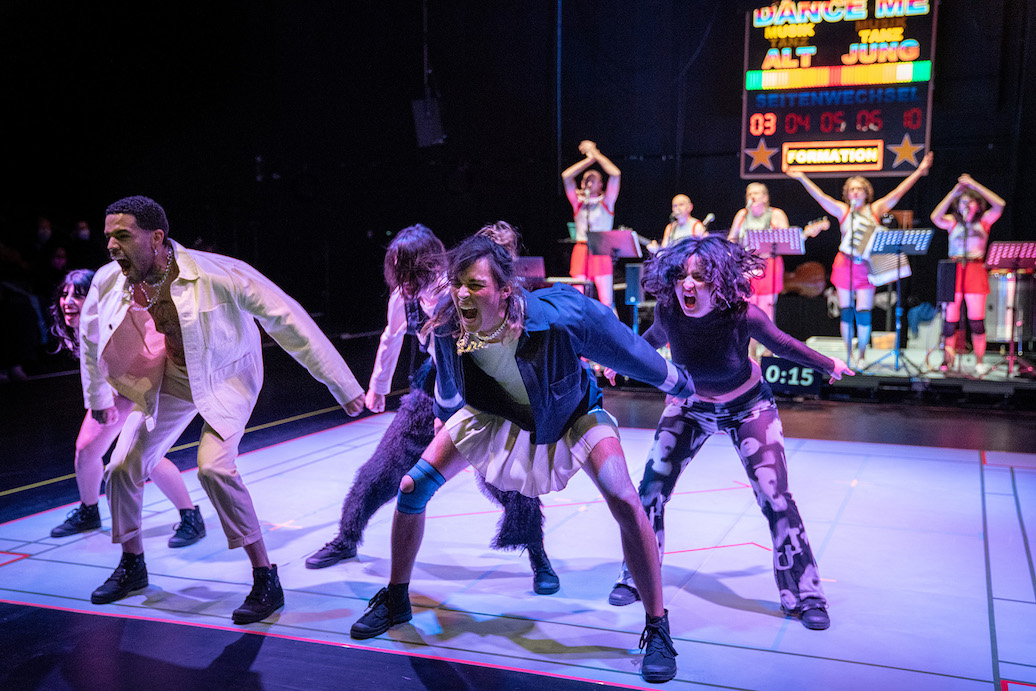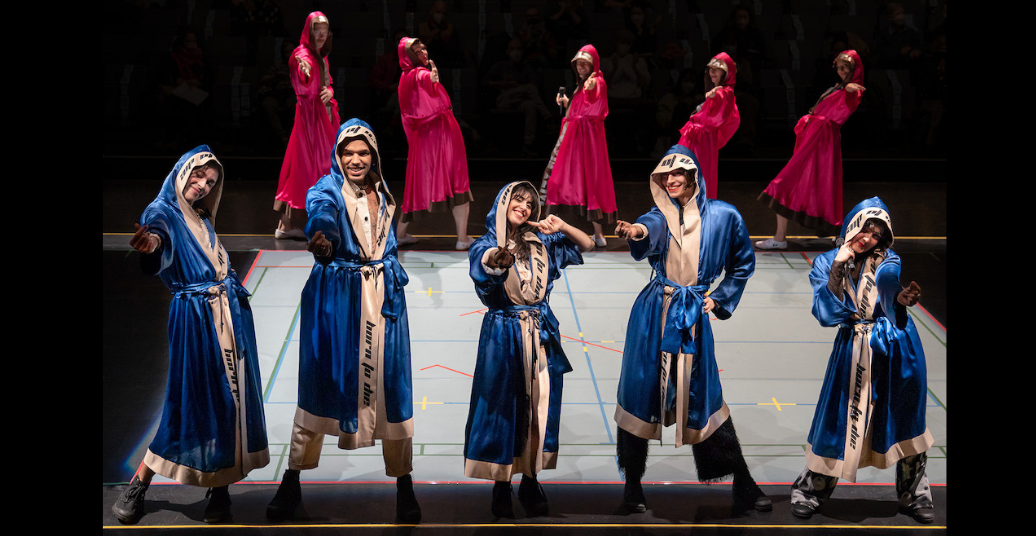She She Pop’s “Dance Me!”, which premiered at Hebbel am Ufer 18-24 January 2022, stages the gap between two generations as a showdown — a dance-off between Team Young and Team Old. How important is it to consider who issued the challenge and to understand its terms?
“We know you. You’re the people who get around by subway or Uber instead of a bike.” — “You’re the people in monogamous relationships.”
Tape marks out a dance floor at the centre of the stage. The five members of Team Young, in robes rimmed with the phrase ‘Born to Die’, take their places five paces from the tape, facing Team Old, wearing the tagline ‘Stayin’ Alive’, on the opposite side. The teams have already introduced one another to the audience with some friendly trash-talk. Now, they’re playing to win.
“You’re the ones who watched porn before you had sex for the first time.” — “You’re the people who have never visited 4chan.”
The teams alternate call-outs and anyone in the opposing team who is correctly described by that call-out takes a step forward. Once a person reaches the edge of the square marked out with tape, they ‘die’. The game ends when one whole team is dead on the dance floor.
“We know you. You’re the people who don’t have accountants.”
This topples all but one member of Team Young. The one left standing laughs and admits that they’ve hired a tax professional — but only very recently. The final member of Team Old is then cut down by a move that everyone agrees is underhand, when the last Young One standing inverts an earlier call-out from Team Old: “You’re the ones who ride bikes everywhere.”
The dance floor then becomes the site of tonight’s battle royale — a dance-off in three rounds. In each round, one team makes the music while the other dances, and vice versa. Small skirmishes in between, like the one just described, determine who claims the (supposed) advantage of dancing for a briefer period. A massive light-up scoreboard tracks their progress, with video game-style health indicators and countdowns. At the end of every round, the scoreboard shows how much health each team has lost. An opaque mechanism appears to determine the team whose health indicator drains the fastest. My difficulty with this isn’t that the game might be rigged, but that it is unclear whether it is — and how, and what the audience should make of it.
She She Pop describes the show on their website as a ‘strict dance ritual’ that celebrates ‘mutual incomprehension, otherwise known as the generation gap.’ This shaky spot in the dramaturgy prompted questions for me about how mutual this can actually be, given the way in which “Dance Me!” doesn’t seem to acknowledge the imbalance I perceived in power between the teams on multiple levels. One of these levels is performance. When the performers explain the showdown we are about to watch, they tell us that the teams “prepared separately” for it, implying they have equal autonomous control over their performances in the dance battles. Team Old is made up of members of She She Pop, a performance collective which recently celebrated its 25th anniversary, and guests selected from their frequent collaborators. The Olds, therefore, potentially have decades of collaboration and a signature approach behind them. Team Young, on the other hand, is, according to the programme notes and project website, just ‘a group of young performers.’
Even though the Youngs’ confidence and stage presence is compelling and the mutual understanding among them palpable, the Olds take several opportunities to fling their individualist approach to the tasks in their faces, as though it were a generational marker only, and not simultaneously a product of the formation of the teams and their respective, very different, experience of (not) working together. Then there is the fact that this cross-generational battle is happening firmly on one team’s home turf. The show plays at HAU, She She Pop’s consistent producing partner over the past two decades. Not only age is at play here.
As a regular Berlin audience member for the last decade, I’ve observed firsthand how She She Pop’s longevity and prominence on the Berlin independent performance scene has also shaped that scene. I have to say that I find a lot of hope in this — She She Pop have spent more than 25 years helping to construct the house they want to live in, and the fact that their principles as a collective both on and off stage have become much more quotidian in experimental performance is arguably because they have insisted on them as crucial elements of their compelling artistic work. This is perhaps why I find I am much more attuned to Team Old’s approach. I can read them better. I am more sure of when they are making fun of themselves, of what their visual and textual citations are, and of their context. What if the audience had been made up primarily of Zoomers like Team Young instead of this standard-looking HAU audience with a tiny minority of younger faces? What if the teams were playing in a space — maybe one of the clubs mentioned offhandedly a few times during the show, maybe via a social media platform — where the Youngs felt much more at home than the Olds?
Given the institutional, structural, and locational frames of the performance, it seems to me that it is hardly possible for the Youngs to be seen as anything other than curious foreign specimens. The playful tone of “Dance Me!” suggests lighter intentions, but if you follow its dramaturgy to its logical conclusion, prospects for members of the born-to-die generation are grim: You’ll dance for your life on a stage somebody else built. And regardless of which team wins the battle, the theatre that we all walk out of at the end of the show will still be standing.

Photo: “Dance Me!”, She She Pop ©Benjamin Krieg
“Dance Me!” (Premiere: 18 January 2022 at HAU Hebbel am Ufer). Concept, idea: She She Pop (the cast changes every evening) / By and with (old): Sebastian Bark, Dan Belasco Rogers, Santiago Blaum, Johanna Freiburg, Fanni Halmburger, Lisa Lucassen, Mieke Matzke, Ilia Papatheodorou, Tatiana Saphir, Claudia Splitt, Berit Stumpf / By and with (young): Hiyam Biary, Eren M. Güvercin, Jan Nwattu, Şimal Nil Şahin, Nikolas Stäudte, Béla Arnaud Weimar-Dittmar, Zelal Yesilyurt, Sindi Zeneli / Artistic collaboration: Laia Ribera Cañénguez, Rodrigo Zorzanelli Cavalcanti / Stage: Jan Brokof / Costume: Lea Søvsø / Costume collaboration: Marie Göhler, Gabi Bartels / Lighting design: Andreas Harder / Lighting design collaboration: Vito Walter / Choreographic consultation: Jill Emerson / Sound: Xavier Perrone.




